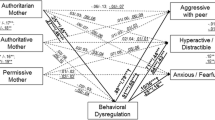Abstract
We examined Bugental's (1987) transactional model in the context of the relationships between aggressive children and their mothers. Based on Bugental's model, it was hypothesized that mothers who possessed the attributional style of low self-control and high child-control over hypothetical child care failure were more likely to manifest negative affect and negative parenting behaviors toward their child, only when their child is aggressive. Children's aggressive behavior was assessed via mothers' and teachers' ratings. Sixty-six children and their mothers served as subjects. Our results provided support for mothers' negative affect when using teachers' rating of children's aggressive behaviors only. Possible explanations for the differential results obtained using mothers' and teachers' ratings of children's aggressive behaviors were discussed.
Similar content being viewed by others
REFERENCES
Achenbach, T. M. (1992). Manual for the Child Behavior Checklist/2–3 and 1992 profile. Burlington, VT: University of Vermont Department of Psychiatry.
Achenbach, T. M., & Edelbrock, C. S. (1981). Behavioral problems and competencies reported by parents of normal and disturbed children aged four through sixteen. Monographs of the Society for Research in Child Development, 46, (Serial No. 188).
Achenbach, T. M., Edelbrock, C. S.,& Howell, C. T. (1987). Empirically based assessment of the behavioral/ emotional problems of 2-and 3-year-old children. Journal of Abnormal Child Psychology, 15, 629–650.
Achenbach, T. M., & McConaughy, S. H. (1987). Empirically-based assessment of child and adolescent psychopathology: Practical applications. Newbury Park, CA: Sage.
Behar, L., & Stringfield, S. (1974a). The Preschool Behavior Questionnaire. In J.V. Mitchell, Jr. (Ed.), The ninth mental measurements yearbook (pp. 649). Lincoln: University of Nebraska Press.
Behar, L., & Stringfield, S. (1974b). A behavior rating scale for the preschool child. Developmental Psychology, 10, 601–610.
Behar, L., & Stringfield, S. (1974c). Manual for the preschool behavior questionnaire. Durham, NC: Author.
Bugental, D.B. (1987). Attributions as moderator variables within social interactional systems. Journal of Social and Clinical Psychology, 5, 469–484.
Bugental, D. B., Blue, J., Cortez, V., Fleck, K., Kopeikin, H., Lewis, J. C., & Lyon, J. (1993). Social cognitions as organizers of autonomic and affective responses to social challenge. Journal of Personality and Social Psychology, 64, 94–103.
Bugental, D. B., Blue, J., & Cruzcosa, M. (1989). Perceived control over caregiving outcomes: Implications for child abuse. Developmental Psychology, 25, 532–539.
Bugental, D. B., & Shennum, W. A. (1984). “Difficult” children as elicitors and targets of adult communication patterns: an attributional-behavioral transactional analysis. Monographs of the Society for Research in Child Development, 49(1, Serial No.205).
Cheramie, G. M. (1994). The AAMD Adaptive Behavior Scale-School edition, Part two: Test-retest reliability and parent-teacher agreement in a behavior disordered sample. Perceptual and Motor Skills, 79, 275–283.
Dix, T., Ruble, D. N., Grusec, J. E., & Nixon, S. (1986). Social cognition in parents: Inferential and affective reactions to children of three age levels. Child Development, 57, 879–894.
Gagnon, C., Vitaro, F., & Tremblay, R. E. (1992). Parent-teacher agreement on kindergartners' behavior problems. Journal of Child Psychology and Psychiatry and Allied Disciplines, 33, 1255–1261.
Goddard, W. H., & Miller, B. C. (1993). Adding atttribution to parenting programs. Families in Society: The Journal of Contemporary Human Services, 74, 84–92.
Hazzard, A., Christensen, A., & Margolin, G. (1983). Children's perceptions of parental behaviors. Journal of Abnormal Child Psychology, 11, 49–60.
Hollingshead, A. B. (1975).Four factor index of social status. Department of Sociology,Yale University. Unpublished manuscript.
Larrance, D. T., & Twentyman, C. T. (1983). Maternal attributions and child abuse. Journal of Abnormal Psychology, 92, 449–457.
McFall, R. M. (1982). Areviewand reformulation of the concept of social skills. Behavioral Assessment, 4, 1–33.
Olweus, D. (1980). Familial and temperamental determinants of aggressive behavior in adolescent boys: A causal analysis. Developmental Psychology, 16, 644–660.
Patterson, G. R. (1976). The aggressive child: Victim and architect of a coercive system. In E. J. Mash, L. A. Hamerlynck, & L. C. Hardy (Eds.), Behavior modification and families:1. Theory and research (pp. 267–316). New York: Brunner-Mazel.
Patterson, G. R. (1982). Coercive family process. Eugene, OR: Castalia.
Sacks, C. H., & Bugental, D. B. (1987). Attributions as moderators of affective and behavioral responses to social failure. Journal of Personality and Social Psychology, 53, 939–947.
Sears, R. R., Maccoby, E. E., & Levin, H. (1957). Patterns of child rearing. Evanston, IL: Row, Peterson.
Walker, L. S. (1985, August). Mother's attributions regarding the behavior of chronically ill children. Paper presented at the annual meeting of the American Psychological Association, Los Angeles.
Author information
Authors and Affiliations
Rights and permissions
About this article
Cite this article
Katsurada, E., Sugawara, A.I. Moderating Effects of Mothers' Attribution on the Relationships Between Their Affect and Parenting Behaviors and Children's Aggressive Behaviors. Journal of Child and Family Studies 9, 39–50 (2000). https://doi.org/10.1023/A:1009407631426
Issue Date:
DOI: https://doi.org/10.1023/A:1009407631426




